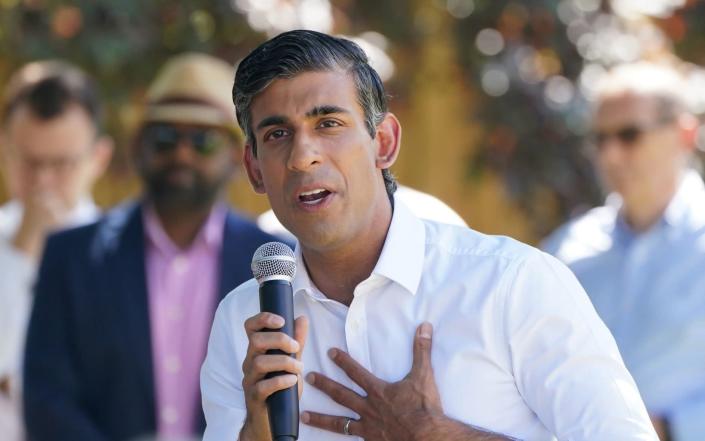
Britain should designate Iran’s Revolutionary Guards as a terrorist organisation following the brutal attack on Sir Salman Rushdie, Rishi Sunak has said, as he warned that the stabbing should be a “wake up call for the West”.
The former chancellor said Iran’s response to the stabbing bolstered the case for proscribing Tehran’s elite military unit, which acts as a protection force to the regime.
He also suggested that the nuclear deal that lifted sanctions against Iran could have reached “a dead end”.
Mr Sunak’s intervention came after Iranian politicians and media celebrated the attack on the 75-year-old writer in the United States.
The suspect, Hadi Matar, of Fairview, New Jersey, was on Saturday charged with attempted murder and assault and remanded without bail.
Mr Matar entered a plea of not guilty in a New York court on Saturday. He appeared in court wearing a black and white jumpsuit and a white face mask, while his hands were cuffed in front of him.


A preliminary investigation by police, including of the 24-year-old’s social media accounts, suggested he was sympathetic to Shia extremism and Iran’s Islamic Revolutionary Guard Corps (IRGC), although there were not believed to be direct links between the suspect and the armed forces.
He was in possession of a fake driving licence that had his own birth date, but the surname of a Hizbollah leader allied to Qasem Soleimani, the Iranian general who was killed in a US drone strike in 2020.
A Facebook account believed to belong to Mr Matar featured pictures of Soleimani and Ayatollah Ali Khamenei, the Iranian supreme leader.
Rushdie was stabbed repeatedly on Friday while on stage at a literary festival at the Chautauqua Institution in western New York state.
[embedded content]
The Indian-born author is on a ventilator at UPMC Hamot in nearby Erie, Pennsylvania, and could lose an eye.
He also sustained nerve damage to his arm, and damage to his liver.
It was reported on Saturday night that Rushdie’s injuries included three stab wounds to the right side of the front of his neck, four stab wounds to his stomach, puncture wounds to his right eye and chest, and a laceration on his right thigh, according to CNN who cited details from the Chautauqua County District Attorney.
The FBI said it was supporting state police and “working closely with our international partners in the United Kingdom to provide additional resources, since the victim is a UK-US dual citizen”.
Malek Shariati, an Iranian politician, said the attack was a “warning to the killers of Qasem Soleimani”.
He added: “If the attack on Salman Rushdie is an operation by Iran, it shows our power.
“If the attacker has done it under the influence of Iran, it proves the success of our Islamic revolution.”
‘Satan on the way to hell’
Iranian media welcomed the attack, with The Khorasan newspaper carrying the headline “Satan on the way to hell”, while the country’s state broadcaster called Rushdie a “heretic”.
Mr Sunak said: “The situation in Iran is extremely serious and in standing up to [Vladimir] Putin we can’t take our eye off the ball elsewhere.”
Warning about the potential futility of attempts to revive the Iran nuclear deal, known as the Joint Comprehensive Plan of Action (JCPOA), he added: “A nuclear-armed Iran would pose an existential threat to our ally Israel, and indeed imperil the whole of Europe with ballistic missile capability.
“We urgently need a new, strengthened deal and much tougher sanctions, and if we can’t get results then we have to start asking whether the JCPOA is at a dead end. The brutal stabbing of Salman Rushdie should be a wake-up call for the West, and Iran’s reaction to the attack strengthens the case for proscribing the IRGC.”
A fatwa calling for Rushdie to be killed over his book The Satanic Verses was issued by the late Ayatollah Ruhollah Khomeini in 1989.


While the Iranian regime appeared to renounce the threat in 1998, in 2019, Khamenei, the current supreme leader, tweeted that the fatwa was “solid and irrevocable”. Activists and opponents of the Iranian regime said its rulers bore responsibility for the attack.
The Washington-based National Union for Democracy in Iran said: “Whether the assassination attempt was ordered directly by Tehran or not, it is almost certainly the result of 30 years of the regime’s incitement to violence against this celebrated author.” The National Council of Resistance of Iran, a banned opposition group, said that the attack had taken place at the “instigation” of the fatwa.
The UK is currently negotiating alongside the US and EU allies in Vienna, to revive the JCPOA.
Under the original agreement, signed in 2015, Iran received relief from sanctions in exchange for agreeing to strict curbs on its nuclear activities.
Donald Trump withdrew the US from the deal in 2018, but Joe Biden has sought to resuscitate it, arguing it is the best way of stopping Iran from developing a nuclear bomb.
Robert Jenrick, a Conservative MP and former Cabinet minister, said that the attack “highlights once again the barbarism of the Iranian regime and its supporters” and that “the regime is not moderating its behaviour”.
On Saturday night, Mr Biden said he was “shocked and saddened to learn of the vicious attack” and said he was praying for the author’s recovery.
The US president added: “Salman Rushdie—with his insight into humanity, with his unmatched sense for story, with his refusal to be intimidated or silenced—stands for essential, universal ideals. Truth. Courage. Resilience. The ability to share ideas without fear. These are the building blocks of any free and open society.
“And today, we reaffirm our commitment to those deeply American values in solidarity with Rushdie and all those who stand for freedom of expression.”




